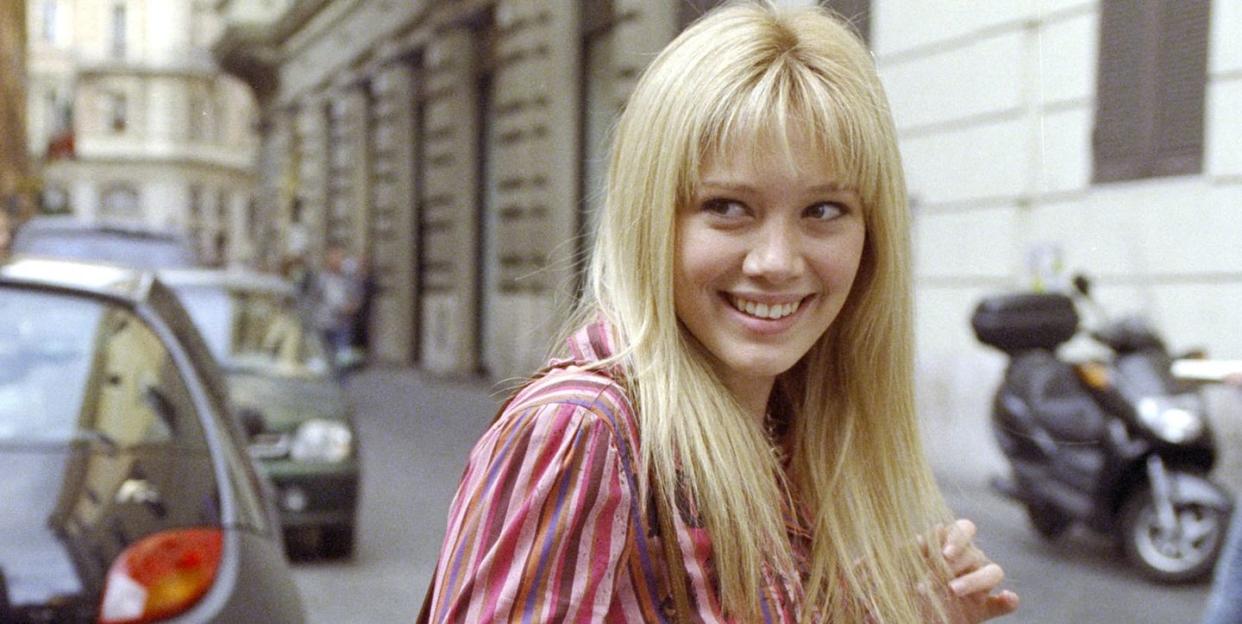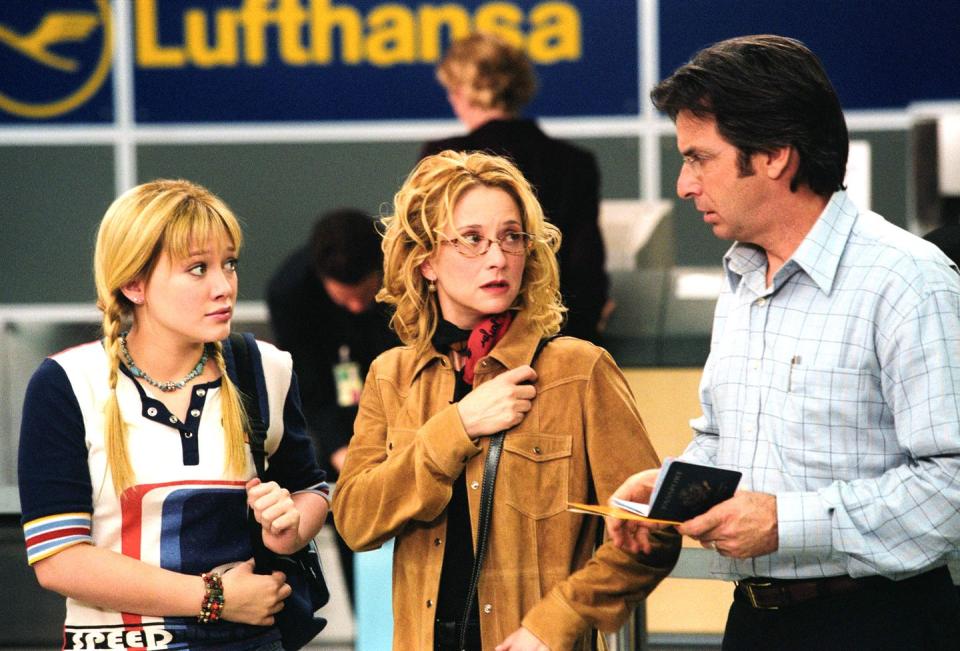Lizzie McGuire Deserves to Grow Up, Just Like We Did

For young adults who came of age in the early 2000s, Disney Channel’s Lizzie McGuire offered a comforting, relatable depiction of adolescence and its many challenges. It gently took on topics ranging from buying one’s first bra to bullying and body dysmorphia, never treating its titular 13-year-old protagonist’s dilemmas as unimportant or fleeting, yet never taking itself too seriously either.
Though the show, which ran between 2001 and 2004, was nowhere near as radical as today’s teenage TV hits, like Euphoria and Riverdale—tackling sex, drugs, and classism to varying degrees of surreality—or as raw as fellow aughties shows, like Degrassi: The Next Generation and Skins, Lizzie McGuire was still relatively revolutionary for the family-oriented Disney Channel. More importantly, it allowed a generation of self-conscious tween viewers to see themselves and the day-to-day issues affecting them, no matter how trivial they seemed, represented on-screen. Perhaps, like me, it also helped them feel just a little less awkward and alone during those dreaded middle school years. (Lizzie’s Sadie Hawkins Dance rejection still stings all these years later, probably because I experienced my very own cringeworthy school dance heartbreak in eighth grade, rhinestone Claire’s jewelry on full display.)
Much to fans’ excitement, in 2019, Disney announced that a revival of the beloved Y2K sitcom was in development for its new digital streaming service, Disney+, with show creator Terri Minsky at the helm and key cast members, including Hilary Duff, ready to bring Lizzie and co. back to our screens. The sequel series, which began production in October, was set to chronicle Lizzie’s life as a young creative navigating career, romance, and the mental minefield we call adulthood as a 30-something in New York City. The synopsis promised a storyline mirroring the milestones and challenges facing today’s OG millennial Lizzie stans, many of whom are now in their late 20s and early 30s too. Duff teased that the show could tackle relatable themes like the looming pressures of deciding to have children. And according to the script, the first episode included subjects of sex and cheating.

Unfortunately, the Disney+ vision of Lizzie was apparently not what our dreams are made of. In early 2020, Minsky was ousted as showrunner amid creative differences with Disney. Production came to a halt, with Disney looking to put “a new lens on the show.”
Duff hinted Disney wanted to see a version of the series that was more “family friendly” than her and Minsky’s take, which also reportedly included themes of same-sex romance. On Instagram, Duff protested Disney’s plans to preserve Lizzie’s squeaky-clean image. “I feel a huge responsibility to honor the fans’ relationship with Lizzie who, like me, grew up seeing themselves in her,” she wrote, adding that she would “be doing a disservice to everyone by limiting the realities of a 30-year-old’s journey to live under the ceiling of a PG rating.” Minksy even said Duff “has a grasp of Lizzie McGuire at 30 that needs to be seen.”
“It's important to me that just as her experiences as a pre-teen/teenager navigating life were authentic, her next chapters are equally as real and relatable,” Duff continued on Instagram, pleading with Disney to move the series to Hulu so they could tackle more mature themes. A similar thing happened to the gender-swapped High Fidelity reboot starring Zoë Kravitz after all.
Lizzie McGuire has always been about the pains of growing up—and the inevitable messiness that comes with it. Back in 2001, for a TV show centered on the middle school misadventures of a preteen girl, that meant unraveling the confusing threads of peer pressure, first kisses, unrequited loves, pubescent shame, evolving friendships, and body image. It’s only natural that nearly two decades after we first met her, Lizzie would be far past her not-a-girl, not-yet-a-woman phase. Her life on-screen should reflect that.
put the Lizzie McGuire reboot on Hulu/Freeform so she can have sex, get drunk, be messy and have a series of existential crises like a normal 30-something year old
— Zeba Blay (@zblay) February 26, 2020
It’s time to see 30 year old Lizzie RUNNING to the Walgreens at 1:00am to buy protection because Ethan is coming over after ghosting her for 2 years. We hate to see it, but it’s time https://t.co/mpGs5pIHwA
— Natasha W.E.B. Lookin' Bois Oladokun 🌚🦗 (@NatashaOladokun) February 29, 2020
LIZZIE MCGUIRE ISNT HAPPENING ANYMORE?!?!?! Lizzie is a grown adult now don’t water the series down to appeal to kids who don’t even care about Lizzie... everyone who grew up with Lizzie are in their 20’s now 😭 give us what we want
— positiviᵗᵉᵃ (@TeaSpillYT) February 27, 2020
We deserve a version of the character that represents her viewers as we are now—a version that makes sense for what Lizzie McGuire would actually be like at age 30. Forget first-time bra-buying woes and mall meltdowns; we want to see Lizzie navigate financial stress and student debt, one-night stands, hangovers, concerns about climate change, and maybe even infidelity. In 2020, millennials are more nostalgic than ever before, especially for the Y2K-era media that defined many of our childhoods and teen years. But we don’t need a sterilized woman-child version of Lizzie McGuire to satiate that nostalgia. Erasing her sexual expression would send a sweeping, subconscious endorsement of sexual purity and align with Western society’s regulation of women’s sexuality in a bid to appeal to potential kid viewers who probably can’t relate to a 30-year-old character anyway.
We need to see Lizzie McGuire’s world expand, too, to reflect a more diverse, realistic social environment that’s less white and less heteronormative than her suburban sitcom stomping grounds. After news of the revival first broke last year, fans on social media quickly voiced their desire to see LGBTQ+ representation, either from supporting characters or Lizzie herself (who, at age 30, could very well identify differently than she did when she was 13). The new Lizzie McGuire would also benefit from featuring more characters of color (problematically, the original series seemed to include only one recurring Black character) and characters who have disabilities, as well as characters from various socioeconomic backgrounds. (Also, we demand #JusticeForLalaine.)
There’s no reason that the modern Lizzie McGuire can’t still offer the same level of irreverence, sincerity, and joy that the original show offered to viewers 15-plus years ago just because she’s grown up now. In fact, we need Lizzie McGuire in 2020, because amid all the chaos of the real world (and the more jaded, melodramatic, edgy television of today), viewers deserve to be both comforted by these familiar characters who feel like family and see their modern experiences and struggles represented on-screen. Life happens in stages, after all, and it’d be both cathartic and reassuring to see that if Lizzie can make it through, we can too.

Despite the revival’s current fractured state, a recent statement from Disney assured fans that we haven’t seen the last of Lizzie yet. “Our goal is to resume production and to tell an authentic story that connects to the millions who are emotionally invested in the character, and a new generation of viewers too,” it read.
While Lizzie McGuire surely deserves to be discovered by new, younger audiences (something they can do right now, by the way, by streaming the original series and movie on Disney+), she also deserves to evolve past her tween limbo—something Duff herself fought to break away from after being crowned Disney’s quintessential tween idol in the early-to-mid 2000s. Post-Lizzie, Duff visibly struggled for years to book roles that allowed her to grow as an actress and move away from the wholesome, limiting good girl archetype she was cemented to a decade and a half ago. Unfortunately, Disney seems set in its intention to sanitize, and subsequently infantilize, the character of Lizzie McGuire by glossing her with a veneer of chastity and apolitical affability.
Since Lizzie McGuire premiered in 2001, its viewers have changed. Hilary Duff has changed. TV has changed. And even Disney has changed. So why shouldn’t a character who is, at her core, an inherent representative for the changing times in our lives be allowed to change too? Lizzie McGuire’s life at 30 should reflect the experiences and struggles of real-world 30-somethings, because that’s why fans connected with the character in the first place—they could see their real, imperfect selves in her, mirrored back at them.
You Might Also Like

